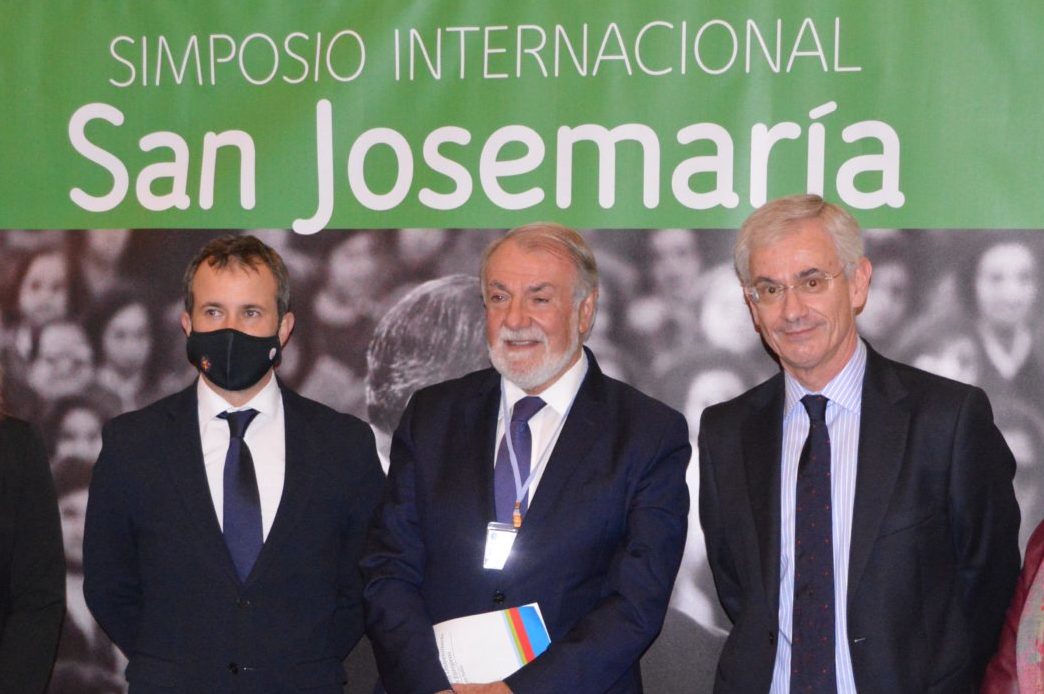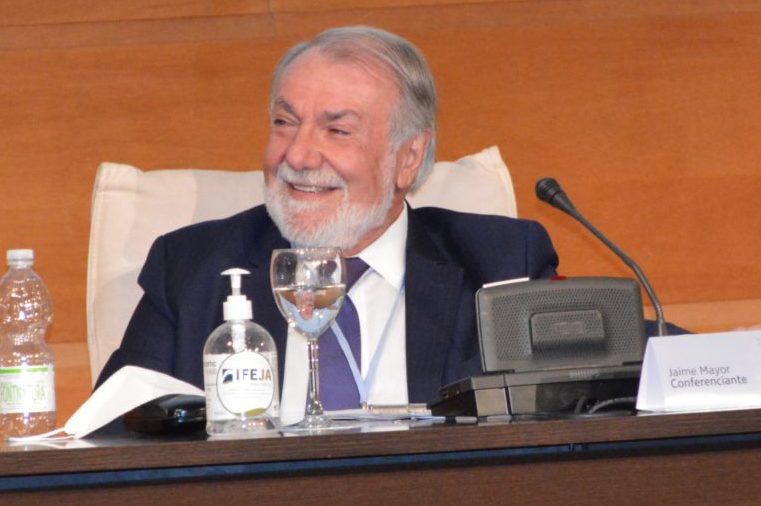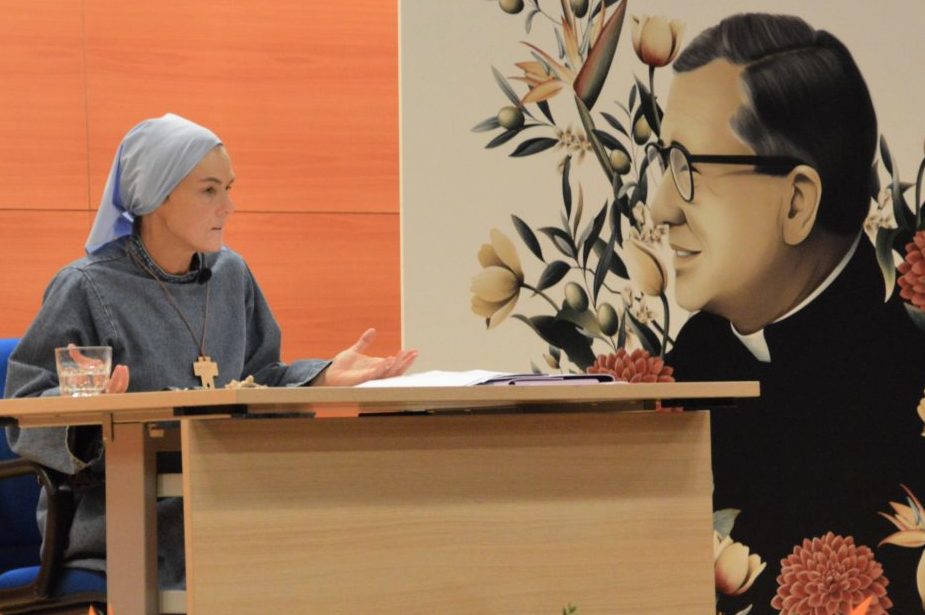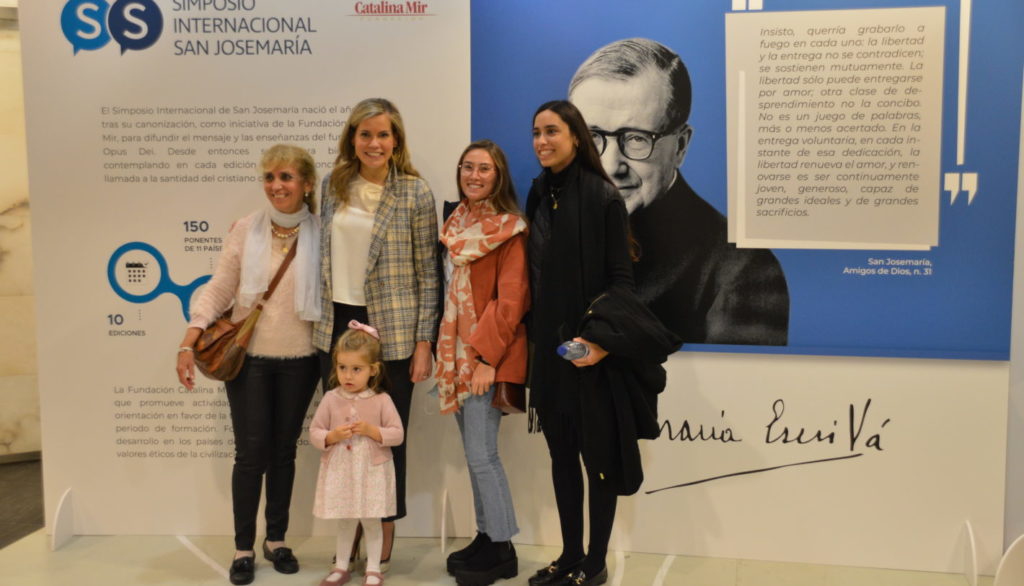"Freedom and commitment are two inextricably linked concepts, as long as we understand the meaning of freedom correctly.". Thus began the former Minister of the Interior, former MEP and now Promoter of the European Federation. One of UsJaime Mayor Oreja, in his address at the inaugural conference of the 10th St. Josemaría Symposium, which was held in Jaén on November 19 and 20. Freedom and commitment.
The St. Josemaría International Symposium is a meeting that aims to reflect on the teachings of St. Josemaría in today's world. It has been held every two years since 2002, with themes such as education, coexistence, the family and freedom. The Symposium is organized by the Catalina Mir Foundation, a non-profit organization that promotes welfare and orientation activities for families and young people in formation. It promotes social volunteering and development in Third World countries. It is inspired by the ethical values of Christian civilization. This year, as in previous editions, it was attended by a large number of young people.
The list of speakers at the Symposium was wide and varied, including prominent names, in addition to former Minister Mayor Oreja, such as philosopher Jose Maria Torralba; Professor Rafael Palomino; Isabel Rojas, psychologist and psychotherapist; Juan Jolín, priest in charge of caring for COVID patients during the pandemic at IFEMA; Rosa María Aguilar Puiggrós, coordinator of the Fundación Aprender a Mirar; Víctor Petuya, president of the Fundación Aprender a Mirar; and Víctor Petuya, president of the Fundación Aprender a Mirar, among others. European Parents AssociationHarouna Garba, migrant from Togo; Toñi Rodríguez, auxiliary numerary member of Opus Dei; Joaquín Echeverría, father of Ignacio Echeverría; Enrique Muñiz and Jesús Gil, authors of the book Let Jesus alone shine; and Javier López Díaz, Director of the St. Josemaría Chair from 2013 to 2019 at the Pontifical University of the Holy Cross.
At the same time, a program was held exclusively for young people, titled Millennials of faith. Among the speakers were, among others, the engaged couple Marieta Moreno González-Páramo and Iñigo Álvarez Tornos, Pietro Ditano, Carla Restoy, Teresa Palomar, or Mother Verónica Berzosa, founder of Iesu Communio.
The truth shall set you free
Mayor Oreja spun his speech using two antagonistic expressions, as a proposal to define two ways of understanding freedom: the first one is the evangelical sentence ".the truth shall set you free". The second is the misrepresentation of this aphorism, "freedom will make you true". It is about "two attitudes of life that confront each other in the main debate before us today". Consider that freedom makes us true ".constitutes a lie". What's more, living like this, thinking that doing what you "do" is the best thing you can do.It approaches selfishness, caprice, superficiality, materialism and banality. It constitutes the expression of moral relativism. That is, nothingness. It leads to believe in nothing or almost nothing. And in this way it has become the dominant fashion."said the former minister.
However, "embrace the evangelical saying the truth shall set you freewill mean a profound and total change in life."Mayor wanted to emphasize. Even so, he considers that the current dominant fashion is based more on the misrepresented sentence than on the evangelical saying. For this reason, "we have to ask ourselves why this prevalence of lies over truth, especially in recent times. We have not known how to manage our improvement in material well-being. We have gone from the prestige of truth to resentment towards it. The dominant fashion has transformed the hierarchy of values.".
Consequently, the former MEP recalled that years ago we used to point out those who did not have a foundation as a "no-foundationsand now it is labeled as "...".fundamentalistsThe "I am not a "I" but a "I", a "I", a "I", a "I", a "I", a "I", a "I", a "I", a "I", a "I", a "I", a "I", a "I", a "I", a "I".

A crisis of civilization
The crisis in Western society, said Mayor, ".it is not a political or economic crisis; it is a crisis of civilization, a crisis of truth, a crisis of foundations, a crisis of conscience.". It is therefore that "when this crisis penetrates the individual, the result is a society presided over by social disorder, which is the main characteristic of current Spanish and European politics and society.".
Therefore, the speaker continued, "We all have an obligation to seek the truth, but those of us who do not hide our faith have a higher degree of obligation than others, because we believe in an absolute truth. This fact of our faith does not constitute a reason for a supposed and absurd moral superiority or of any kind. What it does mean is a greater degree of obligation and service to our society as a whole.". Therefore, it is an obligation for the Christian "not to remain on the surface of the facts, without knowing anything about what is really going on in our society.".
A unique moment in history
"We do not live at any time in Western society", Mayor Oreja assured. "After the political and social fracture that the United States is undergoing, many are trying to replace in Europe an order based on Christian foundations with a social disorder.". He stressed that this is the main challenge facing Christians in today's society. A challenge that faces a "accelerated cultural offensive that began some time ago, which has accelerated in the last decade.". A cultural process that in legislation began by legitimizing abortion, he assured. Paraphrasing the Spanish thinker and philosopher Julián Marías, "it is a cultural process that in legislation began by legitimizing abortion.has been the most serious thing that has happened in the 20th century: the social acceptance of abortion, even to the point of believing that it is an advance and not a regression to the darkest forms of history such as torture or slavery.". Abortion, therefore, would constitute "the first expression of evil in this process. After a few years came the sophistication of evil, in a second phase, more difficult to combat: gender ideology. And in a third moment, the socialization of evil: euthanasia. Which means the expansion and extension of the culture of death.".
This crisis of fundamentals, Mayor Oreja concluded, is based on another crisis. It is a "crisis of faith". "Disregard for the spiritual and religious dimension of the individual and of society"he continued. Therefore, it is necessary to combat this "unhealthy obsession that persecutes us against the Christian foundations of Europe and against the culture of life.". "The most important debate in Europe will take place, in the face of the advance of relativism, between relativism and Christian fundamentals. Between those who believe in nothing or almost nothing and those who try to believe, even if they call us fundamentalists. Neither Europe nor Spain will regenerate by despising its spiritual dimension. They will not regenerate with a vengeance against the foundations that have been the core of our civilization.". On the contrary, he concluded, "we have to search for the truth. We want to confirm that the truth will set us free, from the authenticity of our convictions, of our foundations. And above all from commitment. Freedom and commitment".

Freedom as pilgrims or as wanderers
The relationship between freedom and commitment were the framework themes of the conference held in Jaén on November 19-20. "Teaching how to live freedom today is the greatest challenge of education."said Professor Josemaría Torralba in one of the main lectures.
Professor Torralba explained that "freedom can be understood as the view of a 'pilgrim', one who walks through life from one origin, leaving his home and going to another place, to a goal, another home that awaits him. The pilgrim knows where he comes from and knows where he is going. Therefore, for him, freedom is the ability to reach the goal he has set for himself. On the other hand, the other way of going through life is that of the 'wanderer'; the one who goes from one place to another without any end, and has no home. The wanderer understands freedom as simply deciding things without a clear end, without a goal, without orientation. He goes through life without clear direction".
The professor assured that nowadays it is more and more frequent to find this thought about freedom. The fact of being able to live without ties, "the ties offered by a home, bonds, a family".
Precisely these links, "the commitment"said Josemaría Torralba, ".is a path to freedom". Commitment, therefore, is not something that simply limits us. "Commitment allows us to achieve goods, such as friendship or family.". "And you could say", he continued, "that through commitments we acquire a realized freedom. One gets to make freedom real". The professor of ethics considered that we live in a society where it seems that freedom is achieved as soon as it does not limit one's own life, that which consists in not acquiring commitments. However, "this is a fallacy, a deception, a delusion, a mirage.". On the other hand, "It could be said that the person who has known how to make a good commitment is freer. He has known how to choose the commitments that are worthwhile. Friendship, love, family, society, religion, etc.".
Torralba reasoned that "today, this ability to direct one's own life produces a certain sense of unease.". A feeling that is given because "it is not easy to find one's way around among so many options". He asserted that the solution lies in discovering that freedom is not reduced to autonomy. "We need to learn to walk through life as pilgrims, who have a home and know where they are going. And not as wanderers, who think they are free because they are unattached, but in reality they are not.".
Feeling at home in the world
The philosopher used a very illustrative image to consider the true meaning of freedom: "Freedom in the full sense could be defined with this image, feeling at home in the world.". Feeling at home because you "fits into the circumstances of one's own life. The ones you have chosen, but also the ones that have come about". "The greatness of freedom is to know how not to let oneself be conditioned by the difficult circumstances that arise in life, but to overcome them.".
It is common to associate the dominant relativism with freedom. The speaker conveyed the idea that freedom makes us capable of the lowest, but also, and this is the important and valuable point, freedom makes us capable of the highest and noblest. Therefore, "without freedom there would be no love". And so, in its deepest meaning, "...".To love is to give and share life with another person. It is the most valuable thing we have. It is the ultimate answer to why we have freedom. We are free to be able to love. Today it is more necessary than ever to vindicate freedom.".
To love is to give and share life with another person. It is the most valuable thing we have. It is the ultimate answer to why we have freedom. We are free to be able to love. Today it is more necessary than ever to reclaim freedom.
Josemaría TorralbaPhilosopher and director of the Core Curriculum at the University of Navarra.
At the end of his speech, Professor Torralba made a digression on the idea of good, which is precisely pursued with freedom. "The good", he said, "always has a person's name. It has the name of a friend, of a child, of a spouse, of God. The good is paradigmatically and principally in the actions we perform for these people or together with them. The good cannot be understood as something abstract. It is convenient to avoid the frequent confusion of thinking that the commitment is free exclusively because no one has forced us and because we can undo it.".
Thus, "he is freer who has committed himself". This is "the freedom of the pilgrim, who with each step is approaching his end. The freedom of the wanderer, in its extreme version, is the one who does not make important decisions or establish deep bonds. He is less free because he does not know where it is worthwhile to go. Precisely because freedom is an uncertain opening to the future, it requires, if we want to grow in freedom, a look capable of finding meaning in the situations in which life places us. He who loves, suffers".
Integrating everything in life
The meaning we give to our life "allows us to integrate into our own life what has happened and to adapt to circumstances we cannot change". "The wanderer always remains unsatisfied. And this is a reflection of what abounds today. The wanderer fails to find meaning in what he does. And meaning is not a superficial feeling. It is the experience that one fits into one's life situation".
"It's free." concluded, "the person who, in the situation in which he lives, manages to fit the pieces together, to make sense of the situation, to find a way to make sense of it".".
Faith in the culture of the 21st century
Following the lecture, the Symposium program included three panels, the first one entitled Are these times good? the second Freedom from pain and fearand a third with testimonials.
In the first, the intervention of Professor Rafael Palomino, himself a collaborator of Omnes, was particularly noteworthy. His reflection was based on faith in the culture of the 21st century. A reflection that can be encompassed under the words of Bishop Javier Echevarría, predecessor of the current Prelate of Opus Dei: "The faith in the culture of the twenty-first century is a reflection on the faith in the culture of the twenty-first century.Let us not allow the healthy challenge of encouraging many people and institutions throughout the world to promote -pushed by the example of the first Christians- a new culture, a new legislation, a new fashion, coherent with the dignity of the human person and his destiny to the glory of the children of God in Jesus Christ, to fall into a void.".
Professor Palomino framed his words with data from the barometer of the Center for Sociological Research (CIS). In June 1979, according to these data, 90.03 % considered themselves to be Catholics in Spain. Of these, 55 % considered themselves practicing, and 34 % non-practicing. In September 2021, the same barometer indicates that only 57.4 % consider themselves Catholic and the relationship between practicing and non-practicing is inverted: 18.4 % consider themselves practicing and 39 % non-practicing. We found 2.5 % of believers in other religions and the remaining 38.9 % consider themselves agnostic, indifferent or atheist.
Therefore, it can be seen that Catholicism has ceased to be an influential cultural force. And this is evident because "one of the elements to measure the culture of a country," reflected Palomino, "which is legislation, since 1981 has been introducing social engineering, an experiment to change Spanish society. It began with the modification that introduced causal divorce, which started a process in the legislation. It continued with the decriminalization of abortion, non-causal divorce, same-sex marriage, euthanasia". And the drama is that "legislation makes that which in itself is contrary to human dignity seem totally normal.".
A cultural climate change
It can be said, in this sense, that ".we are experiencing a spiritual glaciation in the west, and a cultural climate change, also for religions.". "The Christian religion needs to be inculturated, to live in the flesh of the people who profess it.".
Professor Palomino offered some specific considerations about this situation: firstly, "it is important that in the public debate, we know how to change the conceptual frameworks. If they tell you 'don't think of an elephant', what you are doing is thinking of an elephant. When they impose the frameworks of reflection on you, they are already setting the limits of the debate.". Secondly, that "the medium is the message. Let not the interposition of the media impede the exposure to the people. What communicates in a community is the joy of being Christians, is a smiling family.". Thirdly, it is necessary to "always have a formation plan in place. Our faith is the faith of the Logos. We are obliged to have a solid formation. To always have a formation plan open.". And finally, that "if you are neither part of the solution nor part of the problem, you are part of the landscape. And a Christian cannot be part of the landscape. For evil to triumph, it is enough for good men to do nothing.".
The Christian religion needs to be inculturated, to live in the flesh of the people who profess it.
Rafael PalominoProfessor of State Ecclesiastical Law.
He concluded by stressing that we must "make faith present in culture. And it is not the same as always. It is about "a new evangelization".

At the closing of the Symposium, the Vicar of the Prelature of Opus Dei in Eastern Andalusia read the Message of the Prelate of Opus Dei, Bishop Fernando Ocáriz. In his message he stated that "the concepts of freedom and commitment are often presented as opposites and yet they are complementary. What is more, they require each other. Without freedom I cannot commit myself, and commitment always implies a free decision". He also assured that, precisely if "we are clear about the reasons for our commitments, the whys and wherefores of our daily obligations, we will be able to fulfill them freely, out of love, even if at times we tire of them and they become difficult for us.









